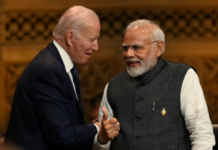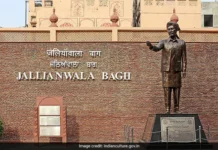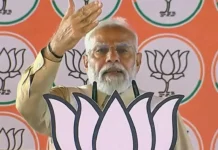JERUSALEM: Foreign Ministers of India and Israel have vowed to work together to strengthen and expand the multi-faceted bilateral relationship for a mutually beneficial partnership, days after a new government was sworn in in the Jewish state.
Israel’s new government was sworn in on Sunday under Prime Minister Benjamin Netanyahu, bringing an end to the longest political deadlock in the country’s history which saw a caretaker government in charge for over 500 days and three back-to-back general elections with no clear verdict.
The vote of confidence in the new government was passed with 73 votes in favour and 46 against in the Knesset (Israeli parliament).
External Affairs Minister S Jaishankar on Monday congratulated his newly-appointed Israeli counterpart Gabi Ashkenazi, a former Chief of Staff of the Israel Defence Forces.
“Mazal Tov @Gabi_Ashkenazi on assuming the post of Israeli Foreign Minister. I look forward to working with you to strengthen our multi-faceted and mutually beneficial partnership”, Jaishankar tweeted in Hebrew.
Ashkenazi thanked Jaishanker and stressed on strengthening ties in diverse fields between the two countries.
“Thank you @DrSJaishankar. I am also looking forward to working with you to strengthen and expand the strong relations between Israel and India in multiple fields”, the Israeli foreign minister tweeted in Hindi and English on Monday.
Earlier, Prime Minister Narendra Modi was among the first few world leaders to congratulate Israeli Prime Minister Netanyahu on Sunday on forming the government for a record fifth time, soon after the Knesset approved the new government.
“Mazal Tov (congratulations) my friend @netanyahu for forming your fifth government in Israel,” Modi wrote on Twitter in Hebrew and English.
“Thank you my dear friend the Prime Minister of India! We will continue to strengthen the important relationship between us,” Netanyahu responded in Hebrew on Sunday.
Netanyahu, 70, and his rival-turned-partner Benny Gantz joined hands to form a coalition government under a power-sharing agreement that would see the latter taking over the premiership on November 17, 2021.
The new government, which according to the coalition agreement, will see Gantz replace Netanyahu as the Prime Minister after 18 months.
Gantz will serve as Defense Minister until he is scheduled to take over as the Prime Minister in November next year. He will till then have the title of ‘Alternate Prime Minister’, something that Netanyahu will take over from him after exchanging the baton.
The beleaguered Israeli prime minister, who surpassed Israel’s first Prime Minister David Ben-Gurion’s record of the longest-serving Premier in the country’s history last year in July, managed to hold on to his right-wing bloc amid three inconclusive polls to force his main rival Gantz to finally succumb to the demand of a broad national unity government.
Gantz campaigned on replacing Netanyahu due to the prime minister’s indictment on graft charges, but dropped his opposition to sitting in a government with him after the latest elections again ended with no clear winner, citing the coronavirus pandemic and a desire to avoid a fourth round of voting.
The move led to the breakup of the Blue and White alliance, with Gantz being elected as Knesset speaker with the backing of Netanyahu’s right-wing religious bloc as they negotiated the terms of the new government.
Ahead of the swearing-in ceremony, Likud and Blue and White on Wednesday evening released the policy principles of the new government, as instructed by Israel’s Supreme Court.
The document said that the government will initially form an emergency cabinet to deal with the coronavirus pandemic and formulate a plan to bring Israel out of the accompanying economic crisis while rolling out a “socioeconomic safety net” and special programmes for citizens who are struggling financially.







